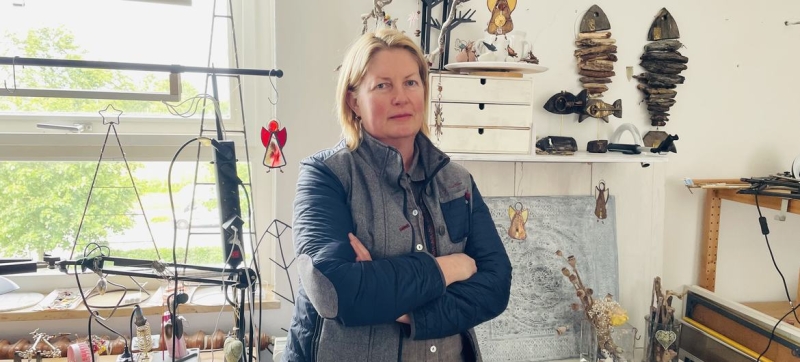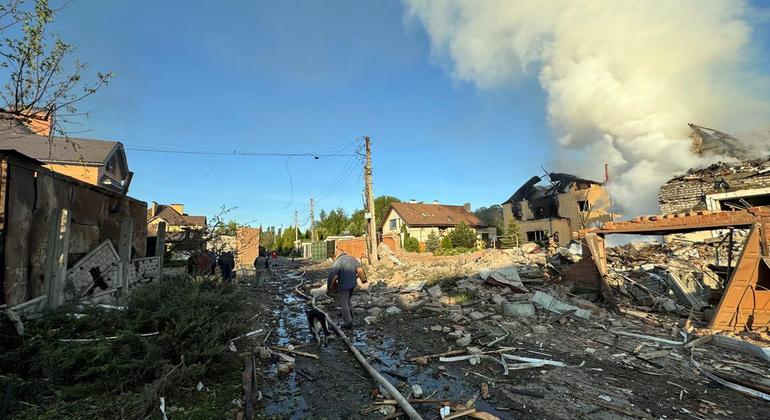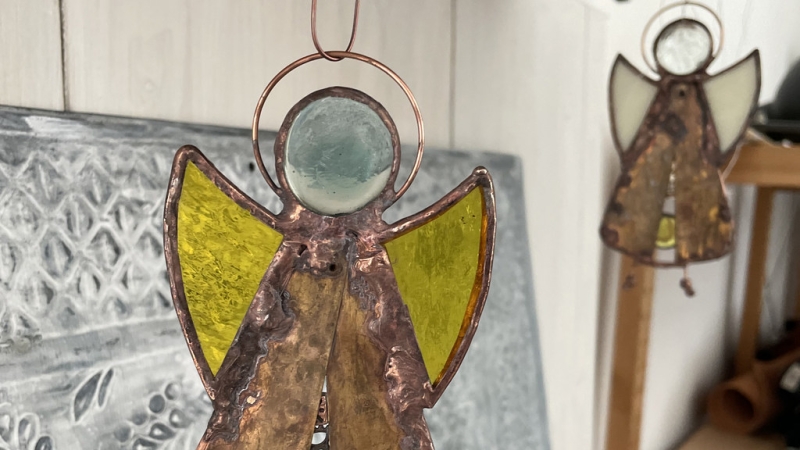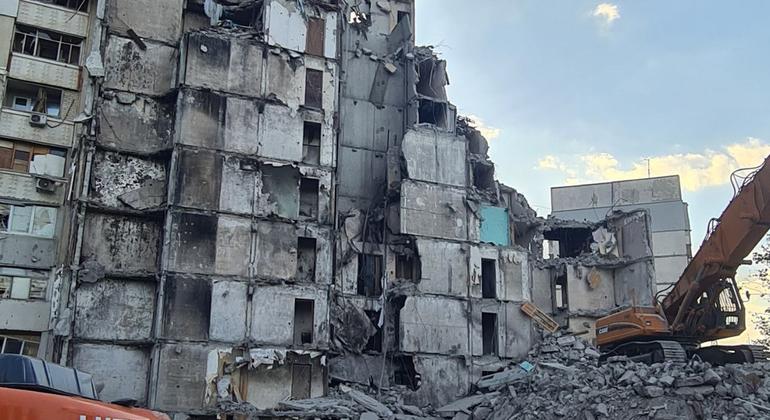
Natalya Nakonechnaya in her workshop. Twice refugees: how the war in Ukraine forced people to leave their homes again Refugees and Migrants
Currently, more than 120 million people in the world are forcibly displaced. Now this is every 69th person on the planet – twice as many as 10 years ago. Ukraine is among the countries with the largest number of refugees – more than six million people. Many of these people have been forced to leave their homes for the second time in recent years.
Natalya Nakonechnaya and her family were forced to leave their home twice: the first time in Crimea, in 2014, when Russia annexed the peninsula, and the second time in Kharkov, with the outbreak of a full-scale war unleashed by Russia in Ukraine in February 2022.
In Crimea
“We lived in Crimea for 20 years. My husband and I met there when we were still very young,” says the Ukrainian woman. – Once, while relaxing, we fell in love with Koktebel. While walking near Kara-Dag, we came across a small street, and I thought – how wonderful it is here, not far from the sea, between the hills. Literally soon we bought a plot there, sold our apartment in Kharkov, built a house and moved. Our youngest son was born then.”
Natalya is a designer who has been working with leather all her life. “I am an architect by training, but when I finished my studies, such specialists were paid very little,” she says. “I tried to sew a wallet and successfully sold it in about fifteen minutes. Then I started sewing more – it all started with a Singer machine, in a one-room apartment, and resulted in my own large two-story workshop. I sew bags, belts, and make leather-bound notebooks. To escape from the routine, there are various creative ideas, for example, weaving a leather chair. This process fascinates me greatly. In Crimea, I began to develop my business, selling my products on the Koktebel embankment, at knightly festivals in the Genoese fortress. Everything was going very well. I enjoyed gardening and planted thirty trees on my property. I also really loved ivy, but it just didn’t want to grow. I watered it for three years. The trees have already grown up and began to provide shade, but the ivy still doesn’t…”
Annexation
“In the summer of 2013, my youngest son and I went to Kharkov on business. But they didn’t have time to return – at that moment Russia annexed the peninsula. I returned to Crimea myself six months later to pick up my things. The children have not been to Crimea since then… For the first time I went to Crimea not by car, but by train. I was amazed by what was happening there – I got out at the station and saw the military, they looked like Chechens, with beards. They looked very unkind. The situation is tense – empty streets, strangers. For the first time I didn’t want to go to the sea. I came to my house – in the yard, six months later, there was laundry drying on the lines, which we did not have time to take off, because we were leaving for only a couple of days. What was also striking was that there had never been theft in Koktebel, but here our water pump was stolen. But this is an inexpensive thing. Why? Some kind of wildness. My neighbor “finished off” me… “You know, I dug up your trees,” she shouted to me through the fence, “you don’t need them anyway, you don’t live here anymore.” As it turned out later, in addition to the fact that our neighbors dug up my trees, they also reported us to the local police,” says Natalya. “It completely killed me.” I put a “For Sale” sign on the house and left. We loved Crimea very much. In the end, we had to sell the house four times cheaper than its cost…”
Crimean ivy
“When we left Crimea, I understood that this was it. We took our things, left the house – I realized that I was closing this door for the last time. And then my gaze accidentally fell on the ivy, which had finally grown! Literally as I walked, I tore a twig from it and put it in my pocket. In Kharkov, I planted it under the house and forgot about it for a while. Meanwhile, the ivy grew by leaps and bounds and became so large that I did not know what to do with it. I advertised on social networks: “Who needs ivy from Crimea? I can share.” And a lot of people responded! I sent it out by mail, and now Crimean ivy lives in different parts of Ukraine.”
In Kharkov
Together with her family (husband and two children), Natalya began to build a new life in Kharkov. “The events in Crimea impressed me so much that I couldn’t work, I went to volunteer at the city military hospital – to help the wounded and their relatives. A year later, I felt that psychologically I couldn’t stand it anymore – I’m not a doctor, and people’s suffering makes an indelible impression on me. I realized that I was running out of steam, found a replacement and left – I returned to my business and set up a workshop. At that moment, the sales market was completely lost for me, but I began to restore it, visiting exhibitions throughout Ukraine. And when everything finally more or less stabilized, the coronavirus pandemic began. I was not at a loss and started selling online. And then a full-scale war began…” Natalya continues.

Full-scale war in Ukraine
On February 23, 2022, Natalya and her husband walked in the central park of Kharkov. “The street was empty, although there are usually a lot of people in the evening. While we were walking home, we discussed all the way whether there would be a war. I said that this couldn’t happen – after all, they couldn’t drive tanks into this beautiful park or launch a rocket here. When we went to bed, my husband said – don’t worry, nothing will happen…
Around midnight I woke up because I felt bad. Around four in the morning, I woke up my husband and asked him to call an ambulance – I couldn’t stand the pain in my stomach. The doctors arrived quickly, gave me an injection and waited until I got better.
At four in the morning our house shook. It was an indescribable feeling – like an earthquake. Hit. Shock. We all ran out into the street. The blows continued, and we stood in a daze and looked at the explosions and flames. The missiles were falling somewhere nearby, and we continued to stand and watch silently – two doctors, me and my husband… At that moment, only one thought was spinning in my head – did they really do it? A deep understanding of what kind of a tragedy happened to us, its reality and inevitability,” the Kharkov resident recalls with horror. “We were in such shock that my husband and I just lay there for two days—our blood pressure rose. The people around were all planning to move from Kharkov to the region, towards Volchansk – they thought that it would be safer there. But, as it turned out, it was even worse. It was amazing how dignified those around us behaved. Yes, there were lines everywhere – at pharmacies, at grocery stores – but nowhere was there any ill will, maximum support for each other.”
Refugees again
When Russian troops appeared in the vicinity of Kharkov, Natalya and her family decided to leave the city: “It was difficult to leave because of heavy traffic jams. We were driving along country roads. The path in the western direction was difficult; the bridge on the Zhitomir highway leading from Kyiv to Lvov had already been blown up, and that direction was completely paralyzed. Along the road there were many cars lying in ditches – it was clear that people crashed due to the exhausting road and extreme fatigue – they lost control and drove off the road. I remember empty cars and scattered things. It was terrible… With a lot of grief, we finally made it to Western Ukraine. But there were rumors that Russian troops would advance from the territory of Belarus, and I decided to take my youngest son to friends in Lithuania. The eldest son, who helped us get to Transcarpathia, decided to return home. He said that he would not forgive himself if he did not help Kharkov now. Despite my requests to at least rest, he was adamant. My heart was breaking, but I took my son to the station, otherwise he would have simply left on his own.”
The next day, Natalya went abroad with her youngest son, her husband temporarily remained in Western Ukraine. “There were a lot of people at the border, but they tried to let them through quickly. We reached Lithuania, stayed there for two days, and the understanding came to us that our son needed to study somewhere. Many of his friends were already receiving education in Germany at that moment, so the decision was made to join them,” recalls the refugee.

“Angels” by Natalia Nakonechnaya, made in the style of the Tiffany company.
Moving to Germany
“In Germany, a complete stranger took us in, provided us with housing, bought groceries, deposited 200 euros and left. For two more months after my arrival, I continued to put all my things back into my bag – I wore them, washed them, and didn’t put them away anywhere. There was a feeling that we would soon be going home, so there was no point in unpacking our suitcases. The hand did not rise to somehow settle down.”
But the war continued, and Natalia had to come to terms with reality, and later move her production (sewing machines and other equipment) from Kharkov – so as not to be bombed.
“In Germany, I was welcomed as an honored guest. The local community of designers and artists literally picked us up – they gave me part of the workshop, they understood that I needed work, an outlet. Since I couldn’t work with leather at first (we didn’t have all the necessary equipment back then), I remembered that once, together with my son, I learned the Tiffany technique, that is, making stained glass windows from glass. One Kharkov master taught us this – we made angels from glass. My child gave it up, but I found it useful,” Natalia smiles. “You don’t need much for this – basically, glass, a turning machine, a soldering iron and a little imagination. In Germany, my work has become in demand – I have taken part in more than one fair, people have bought my angels with pleasure.”

The shelling of Kharkov
Natalya returned to Kharkov three times – to settle personal affairs and organize the relocation of her company: “My last visit was the most difficult – the shelling intensified, day and night. The siren practically did not stop talking. The border “roared” all the time, because it was only 40–50 kilometers from the city, and at night a glow could be seen from the other side. The situation was very tense – we were constantly awakened by explosions and the sounds of drones. A rocket landed a block from our house. Not every psyche can withstand it, it’s endless stress.”
“But Kharkov holds on, it’s like a big leaden fist. Like a wounded Cossack, who, no matter what, stands firmly on his feet and does not move, does not blink – he takes the blow. The city has become grayer, but as one of my friends said, gray is also a color. There is no particular joy visible, but there is no sadness either. Kharkiv residents already have an ironclad self-control – people do their job. You go into a supermarket, turn off the lights – the generators instantly turn on, and everyone continues to work. When my son’s friends come, and at that moment another explosion occurs on the street and I shudder, they carefully move me away from the window, but they themselves are not afraid of anything,” Natalya is amazed and sad at the same time. “It’s a great pity for the city—my favorite places, the streets I used to walk along, my eldest son’s sports school were bombed, as was my nephew’s school. The pool we’ve been going to all our lives too. A lot of good people, unfortunately, are no more – they died in the war.
The driver who picked up my equipment from Kharkov said that he was ready to be in the city for no more than an hour, he wanted to leave as soon as possible – such heavy shelling. But I didn’t take my ivy to Germany – let it be a symbol that we will return home.”
